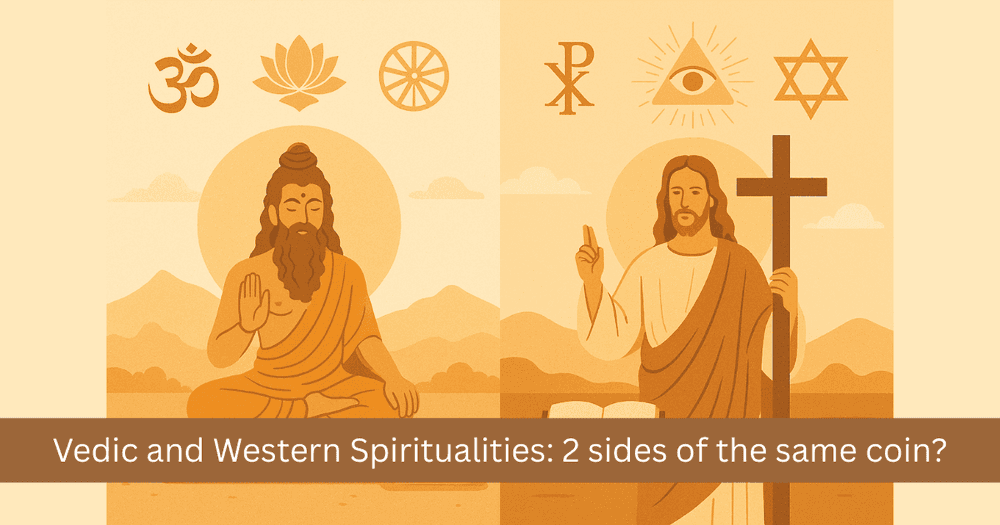The Difference Between Vedic and Western Spirituality: A Comparative Perspective
By Aparna Patni
Key distinctions in philosophy, practice and worldview between Vedic and Western spirituality

Table of Contents
Spirituality is the inner journey that leads the soul toward truth. Across civilizations, cultures have developed unique ways of seeking this truth. In particular, the Vedic (Indian) and Western spiritual traditions are rooted in entirely distinct philosophies, viewpoints and practices. This article aims to outline the key differences between both paths in a meaningful and insightful manner.
1. Philosophical Foundation
Vedic spirituality is anchored in the ancient wisdom of the Vedas, Upanishads, Bhagavad Gita and the Puranas. At its heart lie the principles of dharma, karma, moksha and the cyclical nature of time and rebirth. The ultimate aim is self-realization and unity with Brahman. Western spirituality, shaped by Greco-Roman thought and religions like Christianity and Judaism, places emphasis on faith, divine grace and a linear progression of time. Here, God is viewed as separate from the individual and spiritual emphasis lies on belief, moral conduct and the afterlife.
The History of Astrology - Part 3: Astrology Across Cultures - The Making of a Global Tradition
2. Concept of God and the Universe
In the Vedic tradition, God is accepted in multiple forms - both personal (Shiva, Vishnu) and impersonal (formless Brahman). The universe is regarded as a manifestation of divine energy. In the Western view, monotheism prevails, especially in Christianity, Judaism and Islam. God is seen as the moral architect of the cosmos, standing apart from creation.
3. Practice and Ritual
Vedic spiritual practices are deeply connected to the cosmic rhythm. They include dhyana (meditation), mantra japa, yajna (havan) and deity worship. Each has symbolic alignment with universal energies and time cycles. In Western spirituality, prayer, meditation and collective worship are central. Personal introspection and the institutional role of spaces like churches hold importance.
4. Understanding the Soul
The Vedic view considers the atman (soul) to be eternal and divine. Its highest goal is liberation from ego and maya and complete union with Brahman. Western traditions see the soul as created by God. Emphasis is laid on personal redemption, sin and salvation through divine will.
5. Morality and Code of Conduct
In Vedic thought, morality is based on dharma, which adapts to one’s age, social role and spiritual station. Dharma guides conduct according to inner and cosmic responsibility. In Western systems, morality is often drawn from universal codes like the Ten Commandments. It centers on sin, repentance and salvation through divine grace.
6. View of Nature and Time
The Vedic tradition regards nature as sacred and time as cyclical. The soul passes through recurring cycles of birth and death until it attains moksha or liberation. The Western perspective sees time as linear - beginning with creation and ending in final salvation or judgment. Nature is often seen as something to be controlled, rather than venerated.
7. Spiritual Goal
The final aim in Vedic spirituality is moksha - freedom from the cycle of rebirth and unity with Brahman beyond dualism. The core aim in Western spirituality is union with God in the afterlife, achieved through righteous living and surrender to divine will.
A Deeper Realization
Though both traditions seek self-awareness and connection with the higher truth, their expressions, symbolism and spiritual models differ widely. Vedic spirituality embraces the universe’s inner rhythm and quiet depth. Western paths move toward moral order and personal salvation. Each tradition, if pursued with faith and discipline, guides the seeker closer to inner development and spiritual clarity.
Get your accurate Kundali
Generate KundaliDid you like it?
Author
Aparna Patni (40)
Experience: 15
Consults About: Family Matters, Muhurat
Clients In: MP, DL
Share this article with friends and family




